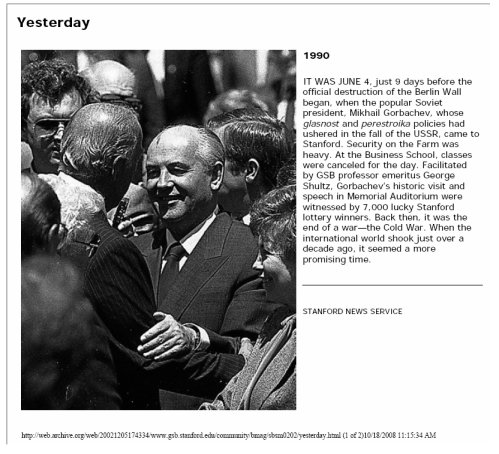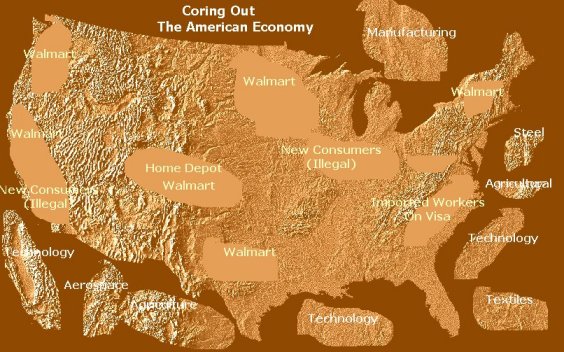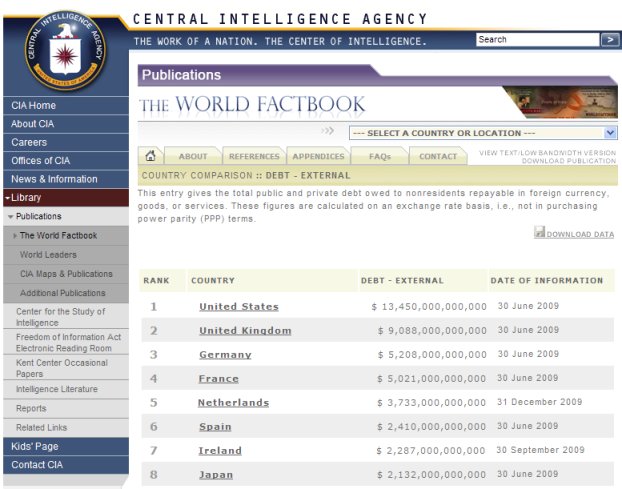Battle of Ideas and Systems - Part 5
Decision Point
In previous work, I wrote a paper called, "1991 - The Year That Changed The World". The concept was right, the year was wrong because changes begin to occur at the decision point - and not the point when you begin to see the changes. The year that really changed the world was 1990. That was the year that George H. W. Bush decided to kill the United States as a nation. But he wasn't alone in his crime against humanity. The collective G8 made the decision eliminate the concept of a nation-state at the 1990, Houston G8 Summit. And since our best universities produce intellectual pygmies who grow up to be slavering "me too" dogs, they apparently saw no problem with it - and actually hired themselves out to aid and abet the demolition and reinvention of government".
On June 4, 1990, Soviet President Mikhail Gorbachev paid a visit to former Secretary of State George Schulz at Stanford University. According to the caption, it was a signal of the end of the cold war.
George Pratt Shultz and Mikhail Gorbachev

Excerpt George P. Shultz biography on the Stanford Business School website:
"From 1981 until his appointment as U.S. secretary of state, Shultz was chairman of President Reagan's Economic Policy Advisory Board. He became secretary of the Treasury in May 1972, serving until May 1974. During that period he also served as chairman of the Council on Economic Policy. As chairman of the East-West Trade Policy Committee, Shultz traveled to Moscow in 1973 and negotiated a series of trade protocols with the Soviet Union. He also represented the United States at the Tokyo meeting on the General Agreement on Tariffs and Trade."
Enterprise for the Americas (pdf)
On June 27, 1990, 23 days after Gorbachev's visit to Stanford, George H.W. Bush, announced the 'Enterprise of the Americas' initiative. Fact Sheet.
Masked in diplomatic language and polite society, the 'Enterprise of the Americas' was about the effective elimination of borders and the integration of government systems and effectively, the elimination of the nation-state.
Excerpts
Thank you all
very much for coming to the White House, and it is my pleasure to
welcome so many distinguished guests with such strong interests in the
vital Latin American and Caribbean region. Let me recognize the many
members of the diplomatic corps that are here and extend to you a warm
welcome -- from Latin America, particularly, and the Caribbean, Europe,
Japan. Members of our Cabinet -- Nick Brady and Secretary Baker, Carla
Hills, Secretary Mosbacher -- delighted you're here. Chairman of the
Council of Economic Advisers, Mike Boskin, is here. Bill Webster,
welcome. And of course, we're delighted to see Alan Greenspan, Chairman
of the Federal Reserve Board, here and then an old friend, Barber
Conable, of the World Bank, and Richard Erb, from the IMF. And Ricky
Iglesias, an old friend of the Bushes, and we welcome him, of the IDB,
and so many leading lights in the business and
financial communities. To all of you, then, a welcome....
...With one exception, that's the case. But the political transformation sweeping the rest of Latin America and the Caribbean has its parallel in the economic sphere. Throughout the region, nations are turning away from the statist economic policies that stifle growth and are now looking to the power of the free market to help this hemisphere realize its untapped potential for progress. A new leadership has emerged, backed by the strength of the people's mandate, leadership that understands that the future of Latin America lies with free government and free markets. In the words of Colombia's courageous leader, Virgilio Barco -- President Barco: "The long-running match between Karl Marx and Adam Smith is finally coming to an end" with the "recognition that open economies with access to markets can lead to social progress."
Back in
February, I met in Cartagena [Colombia] with heads of the three Andean
nations, and I came away from that meeting convinced that the U.S. must
review its approach not only to that region but to Latin America and the
Caribbean as a whole. And I asked Treasury Secretary Brady to lead a
review of U.S. economic policy towards this vital region, to make a
fresh assessment, if you will, of the problems and opportunities
we'll encounter in the decade ahead. And that review is now complete,
and the results are in, and the need for new economic initiatives is
clear and compelling.
All signs point to the fact that we must shift the focus of our economic
interaction towards a new economic partnership because prosperity in
our hemisphere depends on trade, not aid. And I've asked you here
today to share with you some of the ideas, some of the ways we can build
a broad-based partnership for the nineties -- to announce the new
Enterprise for the Americas Initiative that creates incentives to
reinforce Latin America's growing recognition that free-market reform is
the key to sustained growth and political stability.
The three pillars of our new initiative are trade, investment, and
debt. To expand trade, I propose that we begin the process of creating a
hemispherewide free trade zone; to increase investment, that we adopt
measures to create a new flow of capital into the region; and to further
ease the burden of debt, a new approach to debt in the region with
important benefits for our environment.
Let's begin with trade. In the 1980's, trade within our hemisphere trailed the overall pace of growth in world trade. One principal reason for that: overrestrictive trade barriers that wall off the economies of our region from each other and from the United States at great cost to us all. These barriers are the legacy of the misguided notion that a nation's economy needs protection in order to thrive. The great economic lesson of this century is that protectionism still stifles progress and free markets breed prosperity. To this end, we've formulated a three-point trade plan to encourage the emerging trend toward free-market reform that are now gathering forces in the Americas.
First, as we enter the final months of the current Uruguay round of the world trade talks, I pledge close cooperation with the nations of this hemisphere. The successful completion of the Uruguay round remains the most effective way of promoting long-term trade growth in Latin America and the increased integration of Latin nations into the overall global trading system. Our aim in the Uruguay round is free and fair trade, and through these talks we are seeking to strengthen existing trade rules and to expand them to areas that do not now have agreed rules of fairplay. And to show our commitment to our neighbors in Latin America and the Caribbean, we will seek deeper tariff reductions in this round on products of special interest to them.
Second, we must build on the trend we see
toward free markets and make our ultimate aim a free trade system that
links all of the Americas: North, Central, and South. And we look
forward to the day when not only are the Americas the first fully free,
democratic hemisphere but when all are equal partners in a free trade
zone stretching from the port of Anchorage to the Tierra del Fuego.
I'm announcing today that the U.S. stands ready to enter into free
trade agreements with other markets in Latin America and the Caribbean,
particularly with groups of countries that have associated for purposes
of trade liberalization. And the first step in this process is the
now-announced free trade agreement with Mexico. We must all recognize
that we won't bring down barriers to free trade overnight; changes so
far-reaching may take years of preparation and tough negotiations. But
the payoff in terms of prosperity is worth every effort, and now is
the time to make a comprehensive free trade zone for the Americas our
long-term goal.
In Houston, at the 1990 G8 Summit in July, Bush and the leaders of the western world decide to internationalize our financial system; to create the World Trade Organization, and to "reject protectionism in all it's forms" (to make the world safe for all the criminals - and especially the debt slave masters - gangster bankers).
http://www.g8.utoronto.ca/summit/1990houston/declaration.html
G8 Economic Declaration
July 11, 1990 (7-11)
Introduction
New World Order
On September 11, 1990, George H.W.
Bush gave a
speech to a joint session of Congress about the attempt by Saddam
Hussein to annex Kuwait. Why would Hussein try to annex Kuwait?
My guess would be North-South, United Nations regionalization using
strong man tactics. Saddam knew his neighborhood (ref T. Barnett), but apparently
didn't know the deceptive, stealth modern tactics:
"We stand today at a unique and extraordinary moment. The crisis in the Persian Gulf, as grave as it is, also offers a rare opportunity to move toward an historic period of cooperation. Out of these troubled times, our fifth objective—a new world order—can emerge: a new era—freer from the threat of terror, stronger in the pursuit of justice, and more secure in the quest for peace. An era in which the nations of the world, East and West, North and South, can prosper and live in harmony. A hundred generations have searched for this elusive path to peace, while a thousand wars raged across the span of human endeavor. Today that new world is struggling to be born, a world quite different from the one we've known. A world where the rule of law supplants the rule of the jungle. A world in which nations recognize the shared responsibility for freedom and justice. A world where the strong respect the rights of the weak. This is the vision that I shared with President Gorbachev in Helsinki. He and other leaders from Europe, the Gulf, and around the world understand that how we manage this crisis today could shape the future for generations to come. – George Herbert Walker Bush
Paris Club "Houston Terms"
Another 1990 decision was made by the Paris Club. The Paris Club appears to be the accountants for the international gangster bankers. They make offers that can't be refused. The Houston Terms when considered with the G8 Summit decisions for an international trading system with fraudulent "free trade" agreements written against the interests of domestic economies, provide the basis for the accusation of a treasonous plan to rob the American people, loot the assets of our country and to end the United States as a nation - and in fact, to end the concept of nationhood all together for the developed countries.
With the Houston Terms, they devised the means for corrupt politicians to sell the assets of countries out from under the citizens indirectly through fraudulently obtained debt instruments. The outcome of participation in this corrupt international system designed for theft, was inevitable, obvious and expected in view of the terms negotiated in these treasonous agreements.
Morocco was the first country to accept the Houston Terms. That's not surprising considering the special section in the Helsinki Final Act for the Mediterranean countries. The date of Morocco's acceptance of the terms was September 11, 1990.
Excerpts about the Paris Club - from the Paris Club website:
Houston Terms (from History Section)
In September 1990, Paris Club creditors agreed to implement a new treatment of the debt of the lower middle-income countries. This new treatment called " Houston terms " grant three substantial enhancements with respect to classic terms, that can be implemented on a case by case basis:
- non-ODA repayment periods are lengthened to or beyond 15 years and ODA repayment periods are lengthened up to 20 years with a maximum of 10-year grace;
- ODA credits are rescheduled at a concessional rate;
- debt swaps can be conducted on a bilateral and voluntary basis.
As of today, 20 countries have benefited from the Houston terms.
Paris Club agreements may contain a provision enabling creditors to voluntarily engage in debt swaps. These operations may take the form of debt-for-nature, debt-for-aid, debt-for-equity or other local currency debt swaps. These swaps usually take one of the following terms:
- the debtor country directs the servicing of the debt to a fund that will be used to finance development projects in the country (debt-for-development swaps)
- the sale of the debt by the creditor government to an investor who in turns sells the debt to the debtor government in return for shares in a local company or local currency to be used for projects in the country.
In order to preserve comparability of treatment and solidarity among creditors, debt swap amounts for non-ODA claims are capped at a certain percentage of each individual Paris Club creditor's stock of claims. There are no restrictions regarding debt swaps on ODA claims.
To ensure full transparency between creditors, debtors and creditors submit a report to the Paris Club Secretariat on the transactions conducted.
[Meetings] A debtor country is invited to a negotiation meeting with its Paris Club creditors when it has concluded an appropriate programme with the International Monetary Fund (IMF) that demonstrates that the country is not able to meet its external debt obligations and thus needs a new payment arrangement with its external creditors (conditionality principle). Paris Club creditors link the debt restructuring to the IMF programme because the economic policy reforms are intended to restore a sound macroeconomic framework that will lower the probability of future financial difficulties.
The 19 Paris Club permanent members are countries with large exposure to other States worldwide and that agree on the main principles and rules of the Paris Club. The claims may be held directly by the government or through its appropriate institutions, especially Export credit agencies. These creditor countries have constantly applied the terms defined in the Paris Club Agreed Minutes to their bilateral claims and have settled any bilateral disputes or arrears with Paris Club countries, if any. The following countries are permanent Paris Club members:
Agreed Minutes
Participating creditor countries and the debtor country sign Agreed Minutes at the end of a negotiation session. This document states the commonly agreed debt treatment in writing. This is not a legally binding document but a recommendation by the heads of delegations of Participating creditor countries and of the debtor country to their governments to sign a bilateral agreement implementing the debt treatment.
The Paris Club activity is organized around monthly sessions.
These sessions are prepared by a Secretariat General.
The Chair and the General Secretariat of the Paris Club are run by senior officials
from the French Treasury.
[Note: Pay attention to the Chair, and click on his name to see his biography and what he was doing before becoming Chair: Transportation.]
The Chairman of the Paris Club, traditionally a senior official of the French Treasury, is currently Mr Ramon FERNANDEZ, Director General of the Treasury and Economic Policy.
His deputies at the French Treasury and Economic Policy General Directorate serve as Co-Chairperson and Vice-Chairman.
Ms Delphine d'AMARZIT, Assistant Secretary for Multilateral and Development Affairs, is Co-Chairperson, and Mr Rémy RIOUX, his Deputy in charge of International Financial Affairs and Development, is Vice-Chairman.
The Secretary General, currently Mrs Claire CHEREMETINSKI, runs a ten-person team of French Treasury officials.
External debt is one of the sources of external financing for developing countries, with equity (notably foreign direct investment), grants and worker remittances.
This external debt can be classified under different categories.Evian Approach - (WATER - control the water and you control life)
2009 CIA World Fact Book
External Debt Due to Fraudulent "Free Trade" Agreements
"Free Trade" - Coring out the American Economy
through export and Monopoly

Shell Oil Presents the Choice for Americans

On November 21, 1990, a very important treaty was signed. The Charter of Paris for a new Europe spells out in more detail, the principles agreed to in the Helsinki Final Act. The United States was a signatory along with the following countries: Austria, Belgium, Bulgaria, Canada, Cyprus, Czech and Slovak Federal Republic, Denmark, Finland, France, Germany, Greece, Holy See, Hungary, Iceland, Ireland, Italy -European Community, Liechtenstein, Luxembourg, Malta, Monaco, Netherlands, Norway, Poland, Portugal, Romania, San Marino, Spain, Sweden, Switzerland, Turkey, Union of Soviet Socialist Republics, United Kingdom, and Yugoslavia.
To be Continued
____________________________________________________________
Vicky Davis
April 26, 2010
Related Articles:
Movement Politics
Hidden Rivers
Battle of Ideas and Systems
Part 1 -
Introduction
Part 2 -
Declaration of War, December 7, 1988
Part 3 -
Democracy as the Trojan Horse
Part 4 - World of Opposites
